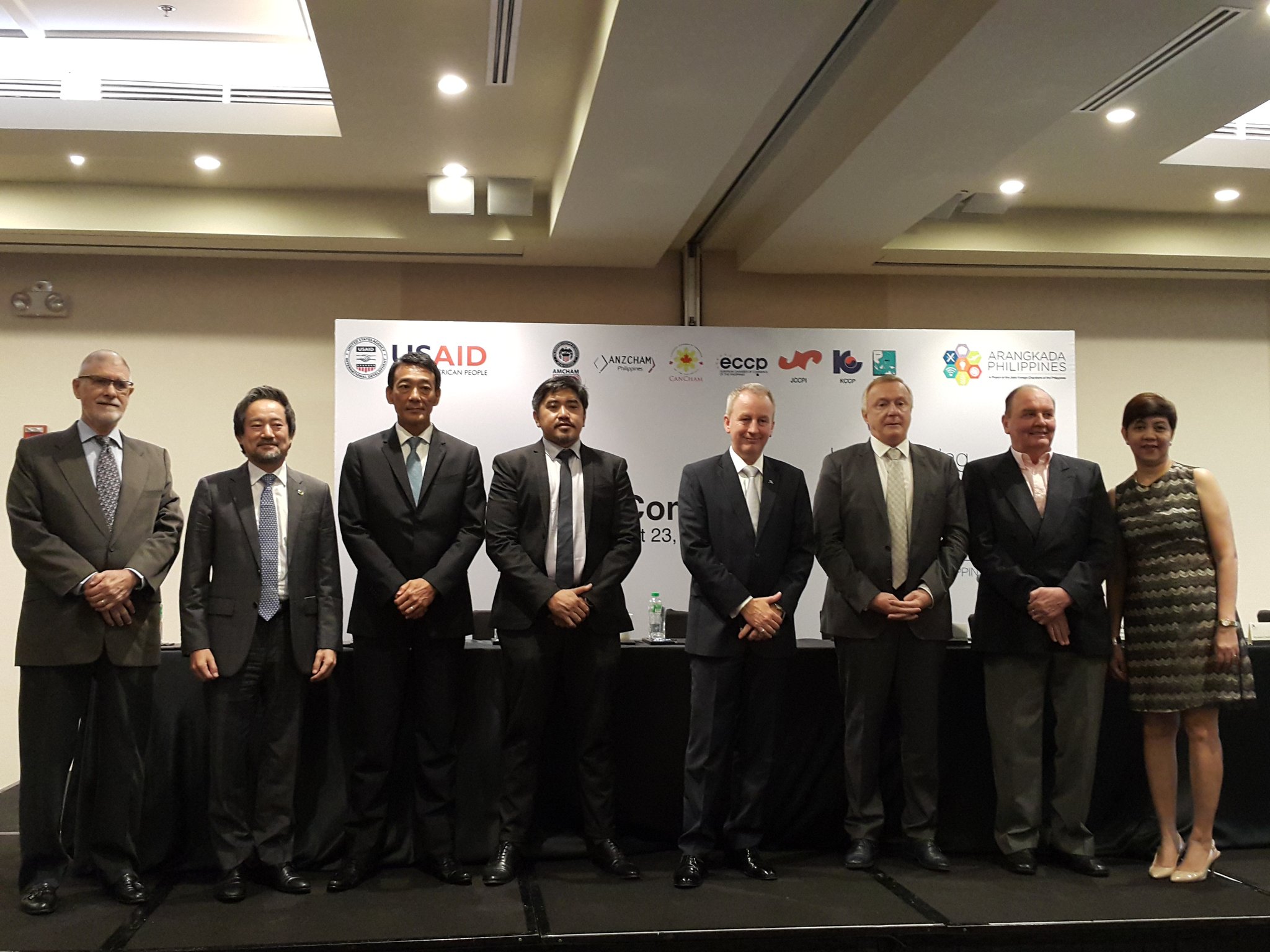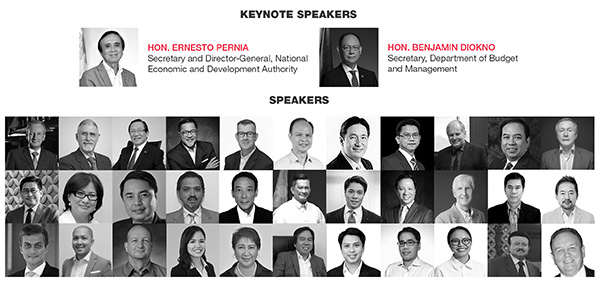On September 14, 2017, the Joint Foreign Chambers (JFC) of the Philippines will hosts its Sixth Anniversary Forum with the theme “Implementing the Ten-Point Agenda” at the Marriott Grand Ballroom.
Continuing the previous forum themes of Move Twice as Fast (2012), Realize the Potential (2013), More Reforms=More Jobs! (2014), Invest NOW for Inclusive Growth! (2015), and A Bolder and More Inclusive Decade (2016), the JFC has selected the theme Implementing the Ten-Point Agenda to discuss key programs, policies, and projects that support achievement of the ten points in the years ahead.
As stated by Department of Finance Sec. Carlos Dominguez at the Dutertenomics Forum II held on April 25, 2017, “(T)he economic program of the Duterte administration…. needs wider public discussion and a broader base of support. The 10-point economic program of the Duterte administration takes into account the large trends defining our economic opportunities. These economic opportunities bear real fruit only if they are undertaken with audacious policy making.”
The forum takes place at a time when the prospects for the Philippine business and investment climate remain very positive. Despite some security issues, which have weakened the country’s image abroad. GDP growth, one of the highest in Asia, remains above 6.5% per annum and has been positive for almost two decades. The unemployment and underemployment rates—the highest in ASEAN—are slowly declining, as is the poverty high proportion of population living with $2 or less a day. Gross capital formation is steadily rising, inflation is low, and foreign reserves are high. FDI has grown over 500% in 2014, 2015, and 2016 to over $6 billion a year, with potential to rise soon above $10 billion. The country enjoys a favorable potential demographic dividend. Nevertheless, its economic engine is not running on all cylinders, a challenge which will be examined at the forum.
Over 40 distinguished experts will share their views, to be discussed within the two frameworks of the Ten-Point Socioeconomic Agenda and the JFC Seven Big Winner Sectors (Agribusiness, Business Process Management, Creative Industries, Infrastructure, Manufacturing and Logistics, Mining, and Tourism). Prominent figures in media namely, Atty. Anthony Abad (Bloomberg), Mr. Jose Roberto Alampay (BusinessWorld), Mr. Coco Alcuaz (formerly ANC), Mr. Quintin Pastrana (formerly Bloomberg), and Ms. Maria Ressa (Rappler) will moderate the five panels.
The five featured panels focus on implementing points of the Ten-Point Socioeconomic Agenda of the Duterte Administration. The panels are:
- Muscling the Economy: Filling the Infrastructure Gap,
- Philippine Industrial Revolution: Manufacturing, Logistics, and Mining,
- Game Changers: Agribusiness, Creative Industries, and Tourism,
- Disruptive Technologies: Artificial Intelligence, Big Data, Drones, Robots, Etc., and
- Philippine Workforce 2030: Human Capital Challenges and Solutions.
Socioeconomic Planning Secretary Ernesto M. Pernia will speak on the Philippine Development Plan and AmbisyonNatin 2040. Budget and Management Secretary Benjamin E. Diokno who will speak on the “Build, Build, Build” infrastructure project of the Duterte Administration. PCCI President George T. Barcelon and House Economics Committee Vice Chair Rep. Joey Sarte Salceda are among other prominent speakers.
Other speakers and panelists include:
- NCC Private Sector Co-Chair Guillermo M. Luz,
- Former MWSS Chairman Ramon Alikpala,
- Former DOTr Undersecretary for Airports Atty. Roberto C.O. Lim,
- Royal Cargo CEO Michael K. Raeuber,
- DICT Usec. Engr. Denis F. Villorente,
- DTI Asec. Rafaelita Aldaba,
- PCCI Transportation, Infrastructure and Logistics Chair Dr. Enrico L. Basilio,
- SEIPI President Dr. Danilo C. Lachica,
- COMP OIC-President Atty. Ronald Recidoro,
- DOT Usec. Rolando Cañizal,
- Creative Industries Expert Henry J. Schumacher,
- Cargill Philippines President Philip Soliven,
- McKinsey & Company Managing Partner Suraj Moraje,
- IDC Philippines Head of Operations Jubert Daniel Alberto,
- USAID STRIDE Project Chief of Party Dr. David Hall,
- AIM Associate Professor Dr. Erika File T. Legara,
- NEDA Usec. Rosmarie G. Edillon,
- Philippine Business for Education Executive Director Love Basillote,
- World Bank Manila Program Leader for Human Development Gabriel Demombynes,
- DOLE Usec. Ciriaco A. Lagunzad III,
- DepEd Asec. Atty. Nepomuceno A. Malaluan, and
- IBPAP President and CEO Rey Untal.
The JFC has invited President Rodrigo R. Duterte to deliver the keynote address.
The JFC will award the fifth Arangkada Lifetime Achievement Awardee to a distinguished retired civil servant. Previous recipients are former President Fidel V. Ramos (2013), former PEZA Director General Lilia B. De Lima (2014), SGV founder and former chairman Washington Z. Sycip (2015), and former Foreign Affairs Secretary Roberto R. Romulo (2016).
Expected attendees include industry and academic experts, investors, and diplomats. In particular the forum welcomes government officials and media as partners in Arangkada’s advocacies of the strong and inclusive growth of the Philippine economy that maximizes domestic and foreign investment, job creation, and an option for more Filipinos to work at home instead of abroad.
The JFC will release a new Arangkada document with pro-business and investment policies related to the Ten-Point Socioeconomic Agenda of the Duterte Administration, drawn from Arangkada 2010: A Business Perspective, previous Arangkada assessments, policy briefs and policy notes, the Philippine Development Plan, Dutertenomics, and two Sulong Pilipinas consultations organized by the Philippine Chamber of Commerce and Industry for business and government leaders.
The Sixth Anniversary Arangkada Philippines Forum is sponsored by the following corporate, organization, and media partners:
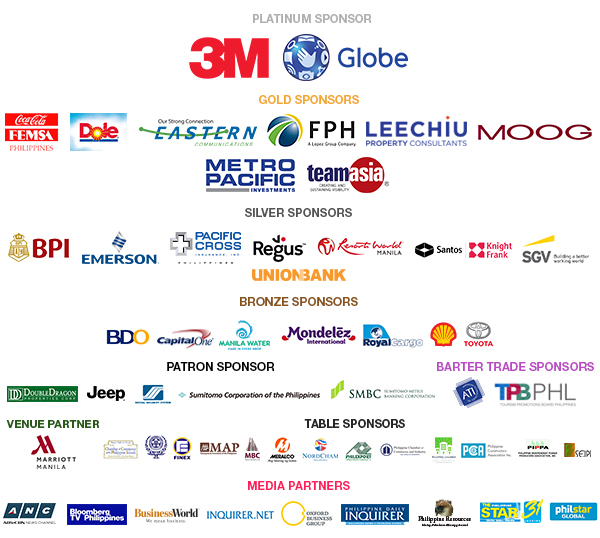
To register, please log on to https://arangkada.teamasiaevents.com/. For assistance, please contact our Registration Manager, Marlon Saquing at +63 2 847 3500 local 310, or email [email protected].
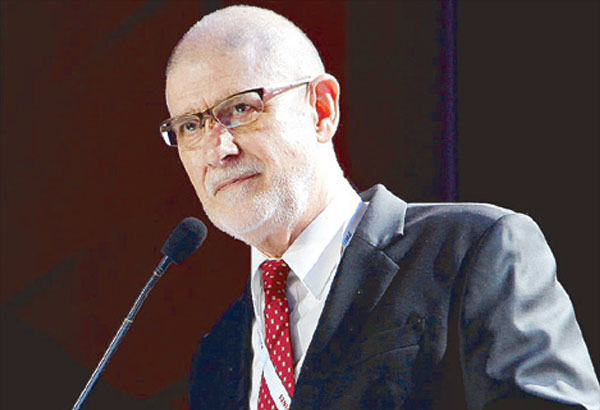
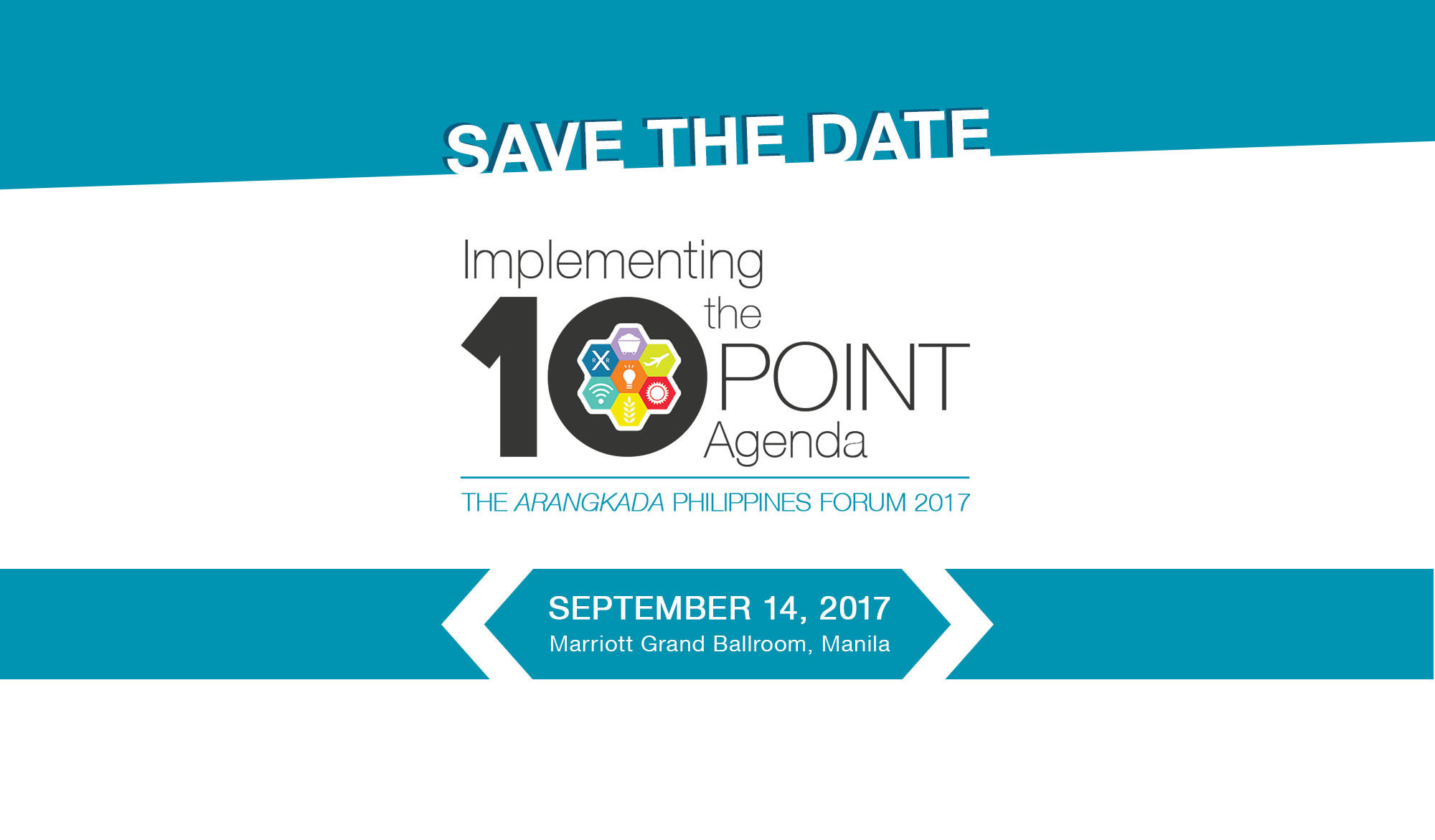

 In building a competitive business environment, judicial and anticorruption policies are very important to attract and to keep investors. Reforms in the administration of justice are ongoing, but their implementation should be continuously intensified.
In building a competitive business environment, judicial and anticorruption policies are very important to attract and to keep investors. Reforms in the administration of justice are ongoing, but their implementation should be continuously intensified.
